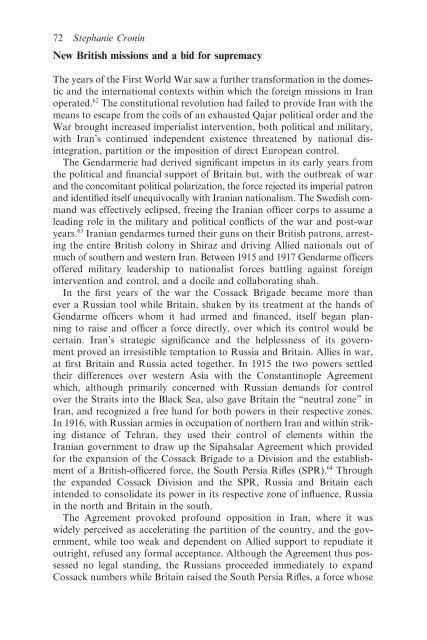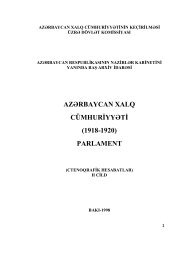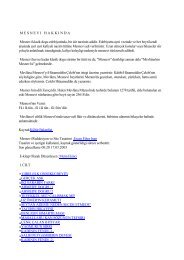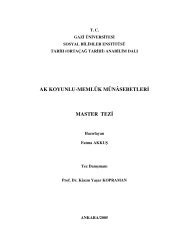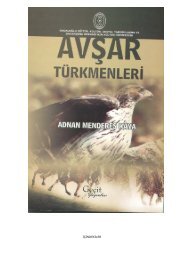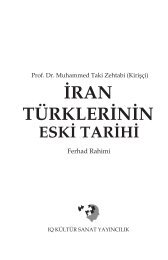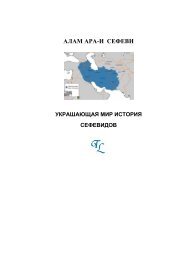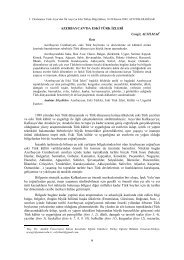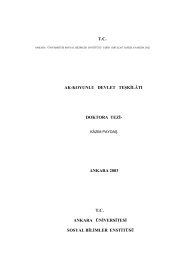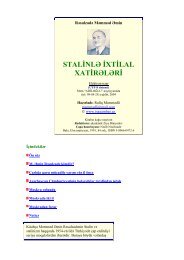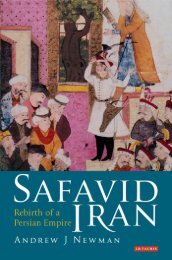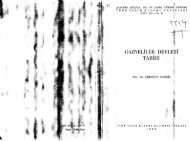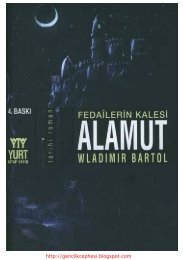War and Peace in Qajar Persia: Implications Past and ... - Oguzlar.az
War and Peace in Qajar Persia: Implications Past and ... - Oguzlar.az
War and Peace in Qajar Persia: Implications Past and ... - Oguzlar.az
- No tags were found...
You also want an ePaper? Increase the reach of your titles
YUMPU automatically turns print PDFs into web optimized ePapers that Google loves.
72 Stephanie Cron<strong>in</strong>New British missions <strong>and</strong> a bid for supremacyThe years of the First World <strong>War</strong> saw a further transformation <strong>in</strong> the domestic<strong>and</strong> the <strong>in</strong>ternational contexts with<strong>in</strong> which the foreign missions <strong>in</strong> Iranoperated. 62 The constitutional revolution had failed to provide Iran with themeans to escape from the coils of an exhausted <strong>Qajar</strong> political order <strong>and</strong> the<strong>War</strong> brought <strong>in</strong>creased imperialist <strong>in</strong>tervention, both political <strong>and</strong> military,with Iran’s cont<strong>in</strong>ued <strong>in</strong>dependent existence threatened by national dis<strong>in</strong>tegration,partition or the imposition of direct European control.The Gendarmerie had derived significant impetus <strong>in</strong> its early years fromthe political <strong>and</strong> f<strong>in</strong>ancial support of Brita<strong>in</strong> but, with the outbreak of war<strong>and</strong> the concomitant political polarization, the force rejected its imperial patron<strong>and</strong> identified itself unequivocally with Iranian nationalism. The Swedish comm<strong>and</strong>was effectively eclipsed, free<strong>in</strong>g the Iranian officer corps to assume alead<strong>in</strong>g role <strong>in</strong> the military <strong>and</strong> political conflicts of the war <strong>and</strong> post-waryears. 63 Iranian gendarmes turned their guns on their British patrons, arrest<strong>in</strong>gthe entire British colony <strong>in</strong> Shir<strong>az</strong> <strong>and</strong> driv<strong>in</strong>g Allied nationals out ofmuch of southern <strong>and</strong> western Iran. Between 1915 <strong>and</strong> 1917 Gendarme officersoffered military leadership to nationalist forces battl<strong>in</strong>g aga<strong>in</strong>st foreign<strong>in</strong>tervention <strong>and</strong> control, <strong>and</strong> a docile <strong>and</strong> collaborat<strong>in</strong>g shah.In the first years of the war the Cossack Brigade became more thanever a Russian tool while Brita<strong>in</strong>, shaken by its treatment at the h<strong>and</strong>s ofGendarme officers whom it had armed <strong>and</strong> f<strong>in</strong>anced, itself began plann<strong>in</strong>gto raise <strong>and</strong> officer a force directly, over which its control would becerta<strong>in</strong>. Iran’s strategic significance <strong>and</strong> the helplessness of its governmentproved an irresistible temptation to Russia <strong>and</strong> Brita<strong>in</strong>. Allies <strong>in</strong> war,at first Brita<strong>in</strong> <strong>and</strong> Russia acted together. In 1915 the two powers settledtheir differences over western Asia with the Constant<strong>in</strong>ople Agreementwhich, although primarily concerned with Russian dem<strong>and</strong>s for controlover the Straits <strong>in</strong>to the Black Sea, also gave Brita<strong>in</strong> the “neutral zone” <strong>in</strong>Iran, <strong>and</strong> recognized a free h<strong>and</strong> for both powers <strong>in</strong> their respective zones.In 1916, with Russian armies <strong>in</strong> occupation of northern Iran <strong>and</strong> with<strong>in</strong> strik<strong>in</strong>gdistance of Tehran, they used their control of elements with<strong>in</strong> theIranian government to draw up the Sipahsalar Agreement which providedfor the expansion of the Cossack Brigade to a Division <strong>and</strong> the establishmentof a British-officered force, the South <strong>Persia</strong> Rifles (SPR). 64 Throughthe exp<strong>and</strong>ed Cossack Division <strong>and</strong> the SPR, Russia <strong>and</strong> Brita<strong>in</strong> each<strong>in</strong>tended to consolidate its power <strong>in</strong> its respective zone of <strong>in</strong>fluence, Russia<strong>in</strong> the north <strong>and</strong> Brita<strong>in</strong> <strong>in</strong> the south.The Agreement provoked profound opposition <strong>in</strong> Iran, where it waswidely perceived as accelerat<strong>in</strong>g the partition of the country, <strong>and</strong> the government,while too weak <strong>and</strong> dependent on Allied support to repudiate itoutright, refused any formal acceptance. Although the Agreement thus possessedno legal st<strong>and</strong><strong>in</strong>g, the Russians proceeded immediately to exp<strong>and</strong>Cossack numbers while Brita<strong>in</strong> raised the South <strong>Persia</strong> Rifles, a force whose


